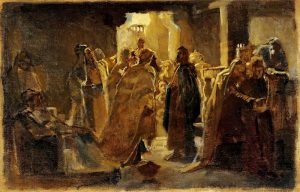\Thoughts on Sunday’s Lessons for July 4, 2021
First Reading (Track One): 2 Samuel 1:1, 17-27
Last week we heard David mourn the deaths of King Saul and Saul’s son Jonathan, David’s beloved friend.

Christ in the synagogue (1868), sketch in oils by Nikolai Nikolaevich Ge (1831-1894). The State Tretyakov Gallery, Moscow. (Click image to enlarge.)
Now David is called by all the tribes and elders to be formally anointed king over all Israel: both the Northern Kingdom with its capital at Hebron, and Judah, the Southern Kingdom, where Jerusalem is the capital. The elders, who had sworn fealty to Saul, now pledge loyalty to David, recognizing that God has called him to be shepherd over Israel. David will reign for 40 years, becoming greater and greater and earning for Jerusalem the title “City of David.”
First Reading (Track Two): Ezekiel 2:1-5
What is it like when we want to share something that’s important to us, but no one will listen … or, worse, people make fun of us for expressing our heartfelt opinion? Sunday’s Track Two readings touch in a way on this spiritual challenge. In the first reading, God calls Ezekiel to prophesy to Israel, an impudent and stubborn people who have rebelled against God. They may choose to hear or not to hear, God tells Ezekiel; but he is to speak truth all the same, so they will know that they have heard a prophet.
Psalm (Track One): Psalm 48
Psalm 48 celebrates the founding narrative of Israel’s kingdom in Jerusalem, where the first temple would be built atop Zion, God’s holy mountain. The Psalmist sings praise to the greatness of God, who placed the city of the great king on this lofty hill, the very center of the world. Let the kings of the earth who might march on Zion in hope of conquest look and be astounded, the Psalmist sings. Let them writhe and tremble and run away, for God has established this citadel forever.
Psalm (Track Two): Psalm 123
Psalm 123 is one of many Psalms titled a “song of ascent,” traditionally regarded as processional hymns to be sung as the priests and people go up the hill toward the Temple. The Psalm calls on a merciful God to hear the prayer of a people whose voices have gone unheard by Israel’s “1 percent,” the contemptuous and scornful rich and proud.
Second Reading: 2 Corinthians 12:2-10
This passage concludes our seven-week journey in Paul’s second letter to the Corinthians, and it leaves us with mysterious concepts. Even bible historians and theologians aren’t sure what Paul means about the “third heaven” or the “thorn” that troubles him but that he does not describe. Perhaps the third heaven describes his own spiritual experience, and the thorn an unnamed illness or disability. But Paul leaves us with no ambiguity as to his point: Through prayer and reliance on God’s grace through Christ, we all can struggle successfully, despite our weakness, to endure hardships that come from both within and without.
Gospel: Mark 6:1-13
Growing crowds have been following Jesus around Galilee as he teaches and heals, and now they follow him back home to Nazareth. His old neighbors and friends are astounded at first, too, by his teaching and preaching in the synagogue. But then they remember that they know this guy. He’s the carpenter’s son! What makes him so high and mighty? Indeed, as Jesus said, prophets are not without honor except in their home town. Then Jesus sends out his followers, two by two, to tell the good news, but he warns them to expect more of the same. Don’t dress up, he says. Don’t act special. If people won’t welcome you for the word you bring, move on down the road until you find people who will.
